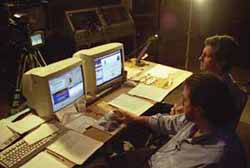Confronting Trauma in School Age Youngsters
TeachLink, a Jerusalem-based distance learning organization, in partnership with TC Innovations, piloted a program funded by the New York Times Foundation designed to help educators in New York City and Israel to consult with one another and share experiences surrounding recent global events since 9/11. The project involved 15 teachers from PS 20 and JHS 56, two schools in the line of site at "Ground Zero."
Two Israelis, Leo Wolmer, a clinical psychologist and Director of School Interventions and Psychology Research, and Daniel Hamiel, the Director of Cognitive-Behavioral Interventions from the Donald J. Cohen and Irving B. Harris Center for Trauma and Disaster Intervention of the Foundation for Children at Risk, located in Tel Aviv, met with the teachers in their schools and held distance learning workshops from TC's Media Laboratory in 256 Macy Hall.
September 11th, 2001, created a situation traumatic in different ways to different groups of young people in the United States. However, that event reflects traumatic situations too often experienced by children around the world from the Middle East to South Africa, Bosnia to Northern Ireland. Educational, medical, mental health and social work professionals in Israel have in fact amassed a great deal of experience in dealing with trauma induced by war, terrorism, and regional conflict and in helping Israeli and Palestinian children to cope under the most trying circumstances. Over time, they have developed both a system of identifying trauma and traumatic reactions and mechanisms of intervention and treatment that have to date been implemented successfully in Israel, Bosnia, and Turkey.
Through video-conferencing and other distance learning technologies, in addition to live face-to-face sessions, this team of Israeli experts addressed trauma in schools, interacted with teachers, administrators, and other professionals in New York City schools, providing training, guidance, and support. The Israelis say that "this classroom activity is designed for children who directly experienced the September 11th terrorist attacks on New York, as well as those who were affected indirectly through repeated media exposure. The aims of the program are to provide a safe environment where the children can express themselves freely, get support from structured group activities, better understand their reactions, learn ways to cope adaptively, and, as a result, make themselves stronger individuals and members of the community."
The program employed a fully interactive distance learning system that enabled video and audio interaction in real time. The system permitted both synchronous and asynchronous interaction, as well as both pre- and post-session transmission of multimedia materials. All materials and live sessions are archived, enabling participant access at all times through computer linkup.
Published Monday, Feb. 24, 2003
